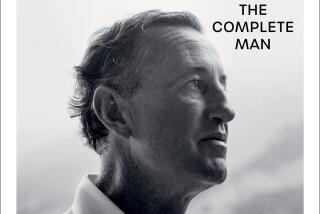Daring World War II memoir may be a little too Hollywood

A sensational upcoming British spy memoir of World War II is replete with derring-do worthy of “Inglourious Basterds”: battlefield bravado, concentration camp horrors, and cameos by J. Robert Oppenheimer and James Bond creator Ian Fleming. “005: Ian Fleming’s Last Agent,” acquired by Simon & Schuster’s UK division in 2012, was praised by editor Kerri Sharp as “everything you’d want to read in a Second World War memoir. It’s a gripping, roller-coaster account of extreme bravery and resourcefulness that also packs a powerful and emotional punch.”
But an investigation by historian Guy Walters in the Daily Mail published last week says author Joe Corry’s account “simply isn’t true.” Walters’ detailed, and seemingly damning, list of Corry’s supposed inventions has caused Simon & Schuster to enlist the help of London’s Imperial War Museum in discerning whether Corry’s memoir, co-written with Keith Laidler, is actually a work of fiction.
According to the Bookseller, a British blog about the publishing industry, Simon & Schuster learned of Corry’s possible inventions earlier this month. “We decided to have an expert read it,” Mike Jones, nonfiction editorial director of the company’s UK division is quoted as saying in the Bookseller. “If it is proved that some of it is not good enough, we will have to make a decision on it then.”
Walters, a former journalist for the Times of London who has written several books on World War II, is certainly not withholding judgment. In his sharply worded article for the Daily Mail, he points out that Corry could not have helped rescue Oppenheimer from Holland during the war, as the famed nuclear scientist was safely ensconced in Los Alamos, N.M. Walters also says that the Special Service Unit in which Corry says to have served did not exist and that Corry could not have been hiding in a house in Normandy with other British troops, watching the American D-Day landing.
Most egregious, according to Walters, are Corry’s accounts of “‘experimental’ extermination camps” in Holland, where Corry writes, “People were lying, crawling and shuffling about, in stinking ankle-deep mud and human excrement.” Walters says that, despite all the true horrors of the Holocaust, these particular camps never existed. He concludes that overall, “the list of falsehoods is astonishing and blatant.”
If Corry is found to have lied, he won’t be the first “memoirist” of World War II and the Holocaust to take liberties with the truth. Most famous among these is Herman Rosenblat’s “Angel at the Fence,” about his concentration camp romance with a woman named “Roma,” which was miraculously reignited, he claimed, many years later in Brooklyn. A book deal with Penguin was canceled in 2008, after the book was discovered to have been a work of fiction. That same year, Misha Defonseca’s “Misha: A Memoire of the Holocaust Years,” was also discovered to have been full of fabrications. These and other instances of similar fabrication are a testament to the grip the Holocaust continues to exert on the imagination — as well as a desire to wrest from its horrors stories of human triumph.
Corry’s own fate as an author remains in limbo, though this is a story he is expert in telling, its veracity notwithstanding. On the British website for Amazon, there is a listing for a book apparently self-published in 2001 by Joe Corry, with David Ramshaw. Called “Towards the Dawn: By One Who Served,” it appears to contain roughly the same account as that which is to be ostensibly published by Simon & Schuster in 2014, should the book survive scrutiny. “Towards the Dawn” did not fare well with online critics. Of the book’s four one-star reviews, one says flatly, “This man tells lies.”
ALSO:
‘Creation’ explains how science reinvents life
FBI kept watch on Mexican author Carlos Fuentes
‘Fifty Shades’ directed by Sam Taylor-Johnson: Will it be good?
More to Read
Sign up for our Book Club newsletter
Get the latest news, events and more from the Los Angeles Times Book Club, and help us get L.A. reading and talking.
You may occasionally receive promotional content from the Los Angeles Times.





